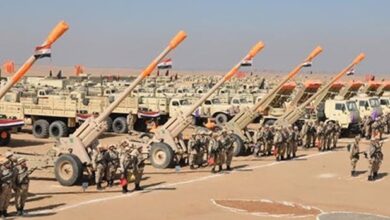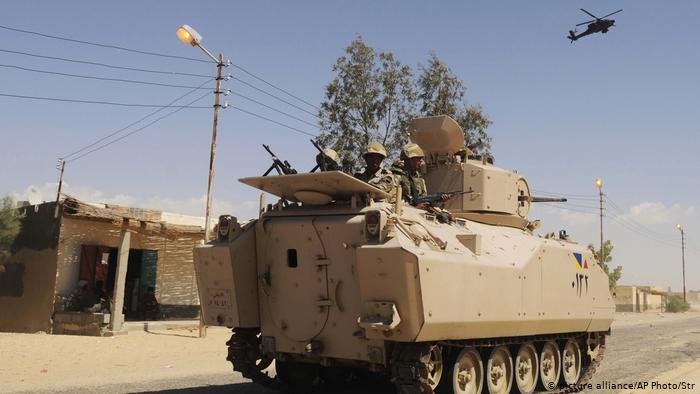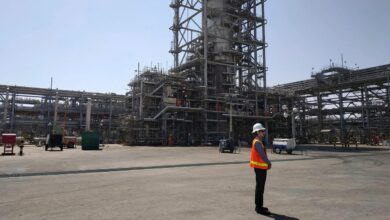After new amendments to Egypt’s Emergency law that pledged the release of all detainees except those who were being kept in custody for terrorism or drug trafficking, many detainees families felt optimistic.
On the Mediterranean coastal city of Arish, Om Ranad and her daughter met with Al-Masry Al-Youm to speak about her struggles, fears and hopes in the absence of her husband, Mosaad Soliman Hassan, known as Abo Fagr.
“Life is tough when my husband is away and I have to provide for the three of us,” said the Sinai lawyer, explaining that her jail visits are costly. Each time she must bring packed food and over LE500 worth of cigarettes, which are an essential part of prison-life as they are used as currency between prisoners.
“Mosaad is not allowed to hand me written letters. Even his list of demands must be checked by security,” said Om Ranad.
Abo Fagr’s wife, Shaimaa’ Msallam, who prefers to be addressed as Om Ranad in respect to Bedouin customs, is a graduate from Cairo University’s school of law, but never had a chance to practice her vocation after giving birth to her now-six-year-old daughter Ranad.
In her last visit, Ranad picked a purple flower and handed it to Mosaad. “When I started crying at the end of our visit he told me to stop crying,” said the detainee’s young daughter.
“I’m hopeful, but suspicious about whether they will free Mosaad,” sighs Om Ranad, who has heard similar rumors during the past two-and-a-half years of his imprisonment. The court has issued 18 release orders for Abo Fagr over the past 29 months, none of which have been implemented.
After midnight on 27 December, 2007, Abo Fagr was detained from his home in the Red Sea city of Ismailia. Around six security men in civilian dress raided his house in the Suez Canal Company’s residential compound.
Police searched the house, taking away his computer’s central processing unit and his collection of books, among other things.
“Ranad was sleeping with a fever and we were planning to take her to a doctor the following day… that was the last time I saw him. He came into our room saying, ‘don’t be afraid’,” recalled Om Ranad, “then I watched him leave the house and enter the police truck… after that I wasn’t able to see him for six months.”
The Sinai activist was later accused of mobilizing protestors to demonstrate against homes being demolished in the areas of Salah Eddin, on Egypt’s border with the Gaza strip, in July 2007. Two weeks after being taken into custody, Mosaad received his first court release order.
Abo Fagr was moved to Cairo’s largest jail a year-and-a-half ago, and spends his detention as a “criminal,” a designation that he objects to as a political prisoner. “A political prisoner has better conditions in jail and better visiting terms,” his wife explained.
Earlier, the activist spent a full year in Borg al-Arab prison, where most Sinai detainees are kept, where he started a food strike along with other Sinai residents to demand better conditions.
“It would take us more than eight hours of traveling From Rafah to Borj al-Arab for just a 15-minute visit where we would see Mosaad from behind bars,” said Om Ranad.
An IT senior manager for the Suez Canal, which is Egypt’s third largest source of foreign currency, Abo Fagr is a descendant of the Remella Bedouin tribe. He and his brother, Ahmed Abo Fager, who were the main breadwinners for the large family, are both being held in detention. Ahmed Abo Fagr, a teacher who has no political involvement, was detained in June 2008 and has also not been released despite court orders.
The activist, who is also a novelist, moved to Ismailia 15 years ago for his job, but continued to strive for the rights of the peninsula’s inhabitants. He would travel every weekend to his home city of Rafah to participate in Sinai’s political scene by advocating for Bedouin rights. He was an active member in the Democratic Front Party, a liberal opposition party.
In 2007, he launched the Wedna N’eesh (“We Want to Live”) movement and blog, calling for Bedouin rights to proprietorship of land in Sinai and their rights to hold government posts in the cities of the peninsula. He also published a novel, Taleet el Badan, the first copy of which came out during his first month in jail and which was completely sold out after its release.
Five months before Abo Fagr’s December arrest the group called for a demonstration in the border town of Rafah to protest a government decision to demolish all the houses that are half-kilometer from the border with Gaza. In an attempt to disperse protesters, anti-riot police used tear bombs and rubber bullets, causing the death of 14-year-old Awda Arafat and leaving 12 injured.
Sinai residents protested again in September and November of the same year, lamenting the martyred teenager and calling for the release of all Sinai detainees. This series of demonstrations is said to have been the reason for the detention of Abo Fagr and other activists.
“We were peacefully demonstrating to ask for our rights. We didn’t deserve to be captured and held in custody,” said Mohamed Abo Noseira, 23, a member of Wedna N’eesh and the son of Yehia Abo Noseira, another activist detained since the protests.
“They don’t want the Sinai people to ever ask for their rights,” added the younger Abo Noseira, who was also detained for two weeks in 2008.
He was asked by security to never again participate in demonstrations. Abo Noseira’s son, however, hardly has time for demonstrations, as he must take care of 14 siblings after the detention of his 50-year-old father. A month ago, Ghanem Abo Noseira, Yehia’s elder brother, was detained for the same reason.
Even though little has been done to secure the release of Sinai detainees, there have been a few sit-ins on their behalf, the last of which was held in January of this year.
They are also receiving support from the Democratic Front Party. “We are proud that Mosaad and Abo Noseira have always been active members,” said party head Osama Ghazali Harb. “They have the full right to defend the sons of Sinai.”
The party, however, remains unsuccessful in securing their release. “There is a lot more we need to do in order to speed the release of these activists, because what is being done against them is against all virtue, since there is no real reason for their detention,” said Harb.
“Mosaad is one of at least a thousand Sinai detainees that should be released if the state were honest about the updated emergency law,” said Ahmed Ragheb, a lawyer from the Hisham Mubarak Law Center who visited the prisoner on Wednesday.
“Abo Fagr is, however, in good shape,” added Ragheb, who had visited the detainee to ask him to write articles for a daily newspaper. Ragheb was able to get Abo Fagr’s writings unofficially since the latter is forbidden from handing out any written materials.
Abo Fagr was recently less than hopeful, “I don’t think they’ll release me despite international presssure… All I ask is to be separated from the criminals and be allowed to pursue my studies,” he said to his lawyer during her most recent visit to Abo Zabal jail south of Cairo.
Despite the release of 600 criminal detainees this week, there is still no sign that the Sinai activists will also be released.
EgyptFeatures/Interviews




